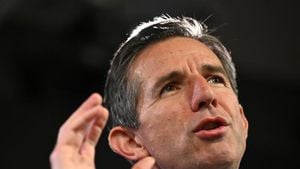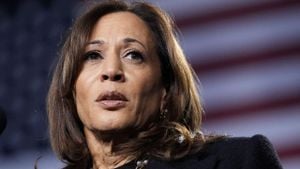Allegations of corruption and intimidation are swirling around Qatar's attempts to influence legal proceedings related to its involvement with the al-Nusra Front, raising serious questions about the integrity of its judicial processes, especially as it prepared to host the 2022 FIFA World Cup. During recent court hearings, details emerged pointing to claims made by eight Syrian claimants who allege they were victims of torture and persecution at the hands of this infamous jihadist group. They contend not only the substantial terror funding encumbered by the Qatari state but also the strategic planning behind Qatar's legal maneuverings, all aimed at derailing litigation to avoid embarrassment during the international event.
The accusatory backdrop centers on the claimants' assertion against Qatari businessmen Moutaz and Ramez Al Khayyat, accusing them of playing pivotal roles financially orchestrated with the al-Nusra Front's activities. This group, designated as terrorist per international standards, has terrorized countless civilians, including the eight plaintiffs, compelling them to flee their homeland. So how far did Qatar go to obscure its ties and protect its interests?
At the heart of the dispute lies Doha Bank, purportedly connected to these financial dealings. Sir Max Hill KC, representing the plaintiffs, described how Qatar's efforts to block any detrimental legal outcomes were orchestrated through blackmail, bribery, and intimidation of witnesses. He called the situation "unique and unprecedented interference," and noted the lengths to which agents would go, including tracking devices and kidnapping threats, to sway witness accounts and diminish the prospects of successful litigation.
Such direct allegations of intimidation paint a worrying picture of how international politics can intertwine with local legalities, providing insight not just for observers of Middle Eastern affairs but for the global community. A particularly chilling point made by Hill was the alleged bribes targeting the claimants' translator, tied to offers including property as well as threats aimed at his very existence. The intimidation allegedly extended to attempts to control testimonies and connections through "fake" plaintiffs aimed at breaching confidentiality.
Claiming to have information supportive of their conspiracy allegations, the lawyers for the claimants referenced UK counter-terrorism police findings which had previously affirmed these concerns and noted attempts to obstruct justice. The court's proceeding brought light to the criminal conspiracy allegedly aimed at silencing these voices, with Hill declaring the interference escalated as Qatar's global spotlight intensified due to the World Cup.
Hannah Brown KC, representing Doha Bank, rebuffed the claims, stating there was no substantiation for the allegations of misconduct. She maintained, “There is no evidence” linking the bank directly to the alleged corrupt practices, working instead to absolve the institution from mismanagement accusations. With the sheer volume of evidence claimed by Hill, ranging from physical threats to psychological coercion, the forthcoming decision could charge Qatar with more than just mismanagement but ignite investigations stemming from these serious allegations.
The allegations of Qatari interference don't end at financial tactics, with the assertion of strong familial ties between the monarchy and the bank complicates the narrative even more. Hill stressed links between the powerful al-Thani family, leading to questions about whether there's genuine independence between state interests and financial institutions like the Doha Bank. If proven, this could lead to significant ramifications not only within Qatar but on the international stage.
Four of the claimants withdrew their case, siding with Hill's assertion of coercion as they faced immense pressure. The broader fear resonates with many observers; should these allegations hold, they reveal the extent to which powerful nations may compromise legal integrity under the guise of protecting their political interests. Thousands of international eyes observed the events leading up to the World Cup; now they’re watching as the courtroom drama continues to unravel these claims.
The gravity of the situation culminates as tensions build, with all parties awaiting judgment. Many legal experts and analysts find merit on both sides; each argument laid before the court opens up systemic discussions about the intersection of state and corporate independence. What remains clear is the possibility of monumental consequences for Qatar’s reputation as it treads through complex legal waters. Transparency and accountability seem to hang delicately as both sides await the court’s ruling. The clock is ticking, with outcomes potentially shaping the narrative of Qatar's international standing for years to come.



